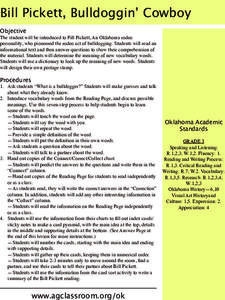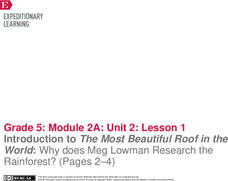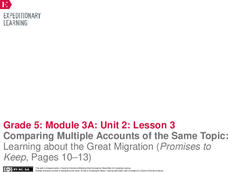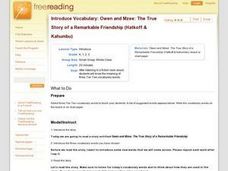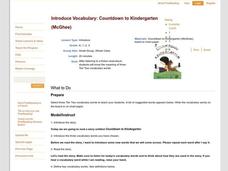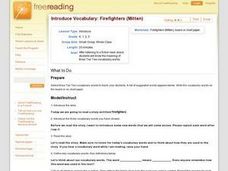Curated OER
Bill Pickett, Bulldoggin' Cowboy
Who was Bill Picket? Interested readers work through an informational passage to find out about a famous "bulldogger" from the old West. They answer several reading comprehension questions and use a seven step process to decode new...
EngageNY
Summarizing Complex Ideas: Comparing the Original UDHR and the "Plain Language" Version
The eighth lesson plan in this series continues the focus on vocabulary and increasing young readers' awareness of academic language. Pairs of learners participate in a short vocabulary review activity called Interactive Words in which...
EngageNY
Close Reading: The Introduction to the Universal Declaration of Human Rights
As part of a group of lessons, your class will return to the primary text for this unit, the Universal Declaration of Human Rights. Key vocabulary as well as close reading strategies continue to be the focus skills; however, this lesson...
Curated OER
Nouns in a Story
Students, assessing a variety of formatting tools with Microsoft Word, utilize a bank of vocabulary words to make a personal dictionary of nouns. They classify nouns for people, places, things and ideas and separate them into common and...
Curated OER
Lesson 2:Context Clues
Using The Life Cycle of an Emperor Penguin by Bobbie Kalman, second graders practice defining unfamilar words with context clues. They come across new vocabulary words and read the entire sentence and the sentence before to find the...
K20 LEARN
Things Are Lit at Thornfield: Jane Eyre
Jane Eyre offers scholars an opportunity to practice reading comprehension skills. Pairs are assigned a word from the text, use their prior knowledge, and consider the context, connotation, and denotation of the word to posit a...
EngageNY
Poetic Tools in Narrative of the Life of Frederick Douglass
Scholars listen to a reading and answer probing questions about If We Must Die by Claude McKay. Readers annotate their personal copies of the poem as they discuss its figurative language, vocabulary, and meaning. They then transfer their...
EngageNY
Exploring Allusions to Myths in The Lightning Thief: Close Reading Part 1 of “Prometheus”
It's all just an allusion. Scholars learn the meaning of allusion and read an allusion in The Lightning Thief. Learners gather in their triads and discuss questions from the text to take a close look at vocabulary words and choose an...
EngageNY
Grade 11 ELA Module 2: Unit 1, Lesson 10
What are you implying? Scholars look at paragraphs eight and nine of the chapter "Of Our Spiritual Strivings" to determine the implications of Du Bois's use of metaphors. In groups, readers discuss the use of metaphors and add their...
EngageNY
Building Background Knowledge: Small-Group Work to Learn More about the History of Wars in Vietnam
Scholars take a close look at "The Vietnam Wars." They answer questions and discuss in groups to conclude that the author respects the Vietnamese. They participate in a modified jigsaw discussion and end the exercise with a quick writing...
EngageNY
Inferring About Character: Atticus (Chapter 5)
As part of their study of Harper Lee's To Kill a Mockingbird, class members participate in a silent discussion of the novel using a Chalk Talk chart. They then respond to the teacher's questions by writing their thoughts on the chart....
EngageNY
Reading for Gist and Answering Text-Dependent Questions: Local Sustainable Food Chain
Readers use sticky notes and a Reading Closely: Guiding Questions handout to record the gist of a different section (pages 161-166) in The Omnivore’s Dilemma. They then pair up and share their ideas. To end the lesson, readers complete...
EngageNY
Introduction to The Most Beautiful Roof in the World: Why does Meg Lowman Research the Rainforest? (Pages 2–4)
Let's go for a walk. Scholars take a book walk through the text The Most Beautiful Roof in the World and create an anchor chart to list the features of informational text. They then take a close look into the character Meg Lowman by...
EngageNY
Using Quotes to Explain: Why Philo Farnsworth Invented Television
Television or radio? Scholars read pages 18-28 of The Boy Who Invented TV: The Story of Philo Farnsworth to discover why Farnsworth thought TV was better than radio. They determine the gist of the section and then look closer at why...
EngageNY
Comparing Multiple Accounts of the Same Topic: Learning about the Great Migration (Promises to Keep, Pages 10–13)
Get the story straight. Scholars gather information about the Great Migration as they listen to a reading from Promises to Keep. They then examine the text to find evidence to support the feeling of resentment. Learners take part in a...
Curated OER
Introduce Vocabulary: Owen and Mzee: The True Story of a Remarkable Friendship
Students explore language arts by reading a children's book in class. For this tier two vocabulary lesson, students read the book Owen and Mzee: The True Story of a Remarkable Friendship and identify the use of specific vocabulary words....
Curated OER
Introduce Vocabulary: The Subway Mouse
Students explore language arts by reading a children's book in class. In this story vocabulary lesson, students read the book The Subway Mouse and identify the use of specific vocabulary words. Students define the selected vocabulary...
Curated OER
Introduce Vocabulary: Countdown to Kindergarten
Students read the story "Countdown To Kindergarten" and choose 3, Tier Two vocabulary words to develop their vocabulary. In this "Countdown To Kindergarten" lesson plan, students define key words from story and refer to them in proper...
Curated OER
Introduce Vocabulary: Firefighters
Students explore language arts by reading a book with their class. In this story vocabulary lesson, students read the book Firefighters and identify the use of specific vocabulary words. Students define the selected vocab words and...
Curated OER
Introduce Vocabulary: Moonbear’s Bargain
Students explore language arts by reading a book in class. For this story vocabulary lesson, students read the book Moonbear's Bargain and identify the use of specific vocabulary words. Students define the selected vocabulary words and...
Curated OER
Introduce Vocabulary: One Hungry Monster
Learners explore language arts by reading a children's book in class. In this tier two vocabulary instructional activity, students read the book One Hungry Monster and identify the use of three vocabulary words. Learners define the...
Curated OER
Introduce Vocabulary: The Story of Ruby Bridges
Students explore language arts by reading a children's book in class. In this story vocabulary lesson, students read the book The Story of Ruby Bridges and identify the use of specific vocabulary words. Students define the selected vocab...
Curated OER
Introduce Vocabulary: In the Small, Small Pond
Students explore language arts by reading a story in class. In this vocabulary word lesson, students read the book In the Small, Small Pond and discuss several vocabulary terms used in the story. Students participate in vocab...
Curated OER
Introduce Vocabulary: The Biggest Pumpkin Ever
Students explore vocabulary by reading a children's book in class. In this tier two words lesson, students read the book The Biggest Pumpkin Ever and identify the use of specific vocabulary words. Students define the selected vocabulary...


